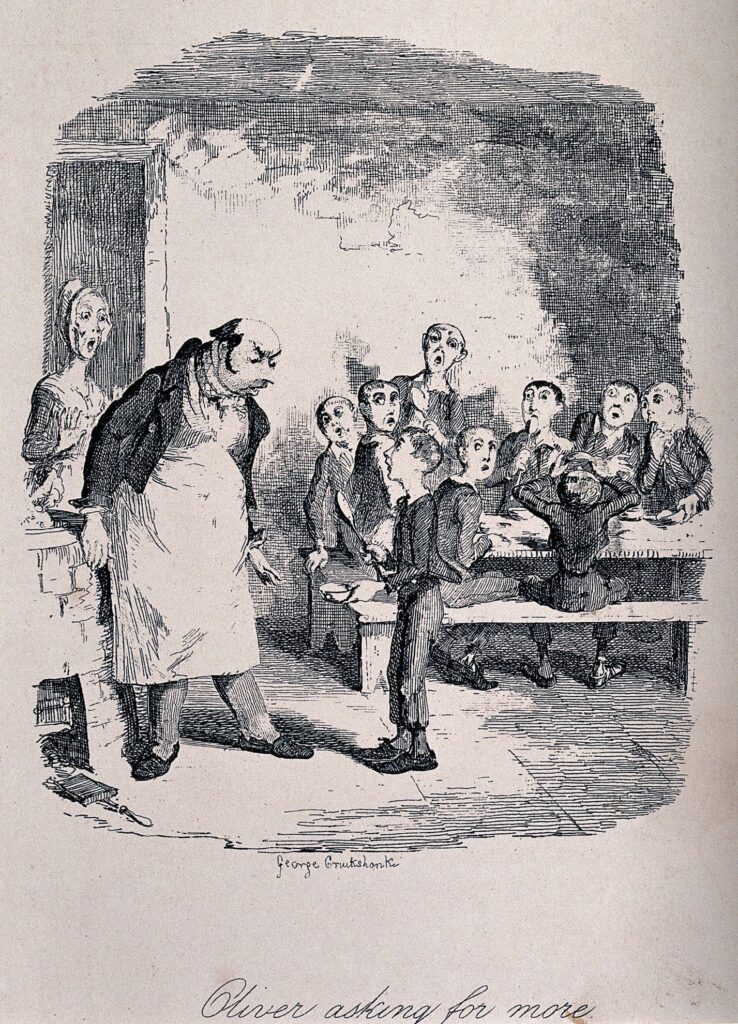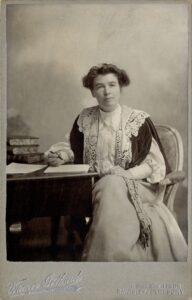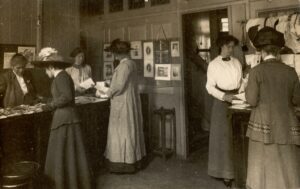Articles & Links
Articles and Blogs
Podcasts and Recordings
Book Reviews
Articles and Blogs
The Human Interest Brothers: Dickens and Character
Even if you don’t read Charles Dickens, you’ve probably heard of some of his characters – Scrooge, for example. But who was his greatest creation? This was the theme of a short talk I gave at the Hawkesbury Upton Literature Festival’s Tenth Birthday Special on Saturday 27 September 2025 which was on “Strength of Character”.
Read or download (pdf document) The Human Interest Brothers: Dickens and Character.

Oliver asks for more.
Picture Credit: Oliver Twist, holding a bowl and a spoon, asks for more food, while other children and a woman look surprised. Etching by George Cruikshank, Wellcome Collection, Public Domain
Spotlight on...Gertrude Baillie-Weaver (1855-1926)
The latest Spotlight On looks at Gertrude Baillie-Weaver, anti-vivisectionist, suffrage campaigner, and theosophist. If she is remembered at all today, it is probably as the author G Colmore whose 1911 novel Suffragette Sally was republished by Pandora Press as Suffragettes: A Story of Three Women in 1984.
Read previous Spotlight Ons in the Spotlight On Archive (pdf document).
‘A fine thing gone wrong’: Winifred Coombe Tennant and the Suffragettes
Suffragist or suffragette: what’s the difference and does it matter? Welsh suffragist Winifred Coombe Tennant thought so. Winifred Coombe Tennant (1874-1956) was president of the Neath branch of the National Union of Women’s Suffrage Societies. She was a Liberal, a patron of Welsh art, a member of the Gorsedd of Bards, and a campaigner for social reform in Wales. She was the first woman JP for Glamorgan, and the first woman to be appointed as a delegate to the League of Nations. Read about the life and work of this remarkable woman in South Wales.
In an increasingly violent atmosphere it became harder to obtain a hearing for women’s suffrage arguments. The root of the problem, Winifred thought, was the ‘confusion and prejudice in the mind of the public’ created by the misapplication of the words ‘suffragist’ and ‘suffragette’.
Read or download (pdf document) A fine thing gone wrong: Winifred Coombe Tennant and the Suffragettes
A long and loving association and friendship: Esther Knowles and Emmeline Pethick-Lawrence
 In December 2019 Esther Knowles’s great niece in New Zealand sent me a copy of a letter from Esther to her employer, Emmeline Pethick-Lawrence, written in 1950. Esther Knowles worked at WSPU head office and subsequently for WSPU leaders Emmeline and Frederick Pethick-Lawrence, and was for many years Frederick’s private political secretary. In this article I look at the contents of the letter and explore its context.
In December 2019 Esther Knowles’s great niece in New Zealand sent me a copy of a letter from Esther to her employer, Emmeline Pethick-Lawrence, written in 1950. Esther Knowles worked at WSPU head office and subsequently for WSPU leaders Emmeline and Frederick Pethick-Lawrence, and was for many years Frederick’s private political secretary. In this article I look at the contents of the letter and explore its context.
The letter is dated 25 February 1950, two days after the British General Election. In it, Esther wrote about her response to the election results, her wish to know what Emmeline thought about it, and her longing that the two should meet to talk it over. Relying on their “long and loving association and friendship”, she was confident that “you and I…understand each other wholly. You will know therefore that I feel this impulse to commune with you, in a sense of deep humility in the confident knowledge that you will not construe it into presumption”.
Read or download (pdf document) A long and loving association and friendship: Esther Knowles and Emmeline Pethick-Lawrence
Picture Credit: Women’s Library on Flickr, No Known Copyright Restrictions
Thanks to the woman who did the typing
 “My thanks are due also to my secretaries, Miss Esther Knowles and Miss Gladys Groom, for turning their task of typing the MS into a labour of love”.
“My thanks are due also to my secretaries, Miss Esther Knowles and Miss Gladys Groom, for turning their task of typing the MS into a labour of love”.
With these words Frederick Pethick-Lawrence, one-time leader of the Women’s Social and Political Union, Labour MP, and secretary of state for India acknowledged the work of the women who typed the manuscript of his autobiography, Fate Has Been Kind (1943). It’s often struck me how many books include thanks to the women who did the typing. In a blog published on the Women’s History Network blog I take a closer look at the women whose work was so essential but rarely visible.
Picture Credit: Women’s Library on Flickr, No Known Copyright Restrictions
Writing the Life of Suffrage Campaigner Millicent Price
A blog for the Women’s History Network on why I chose to write a biography of suffrage campaigner, Millicent Price (née Browne). She’s not particularly well known, and although she started out in the WSPU, she later rejected suffragette militancy. And that’s one of the things that makes her so interesting!
A blog for the Women’s History Network pondering the question of who gets a biography written about them.
“The suffragettes’ demand for justice was dismissed as a form of madness.”
Guest blog on David Lawlor’s blog, History With a Twist, with a blog about how the government tried to use laws designed to cope with the mentally ill to deal with militant campaigners.
A is for Arson, Nonesuch, Spring 2003 (pdf document)
Find out why University of Bristol students attacked the Bristol WSPU shop in 1913 – an article written for Nonesuch, the University of Bristol Alumni magazine.
Podcasts and Recordings
Catherine Marshall and the First World War
Suffragist and pacifist Catherine Marshall was one of the British women who campaigned for peace during the First World War. She was a founder member of the British branch of the Women’s International League for Peace and Freedom, and she helped to keep the No-Conscription Fellowship going when Fenner Brockway and other N-CF leaders were imprisoned.
This short (eight minute) presentation is excerpted from ‘Peace Women and the First World War’, a talk examining a range of responses by British women peace campaigners during the First World War, and is available (free) on Substack.
A short presentation looking at how the women of the militant Women’s Social and Political Union spent the festive season, based on a talk given at the Hawkesbury Upton Literary Festival Christmas Special on 2 December 2023. Available on Substack (free). Running time just over eight minutes.
Miss Browne’s Pluck: A Suffragette in North Wales (scroll down)
A short presentation (Powerpoint with spoken commentary, with accompanying notes) for the British Association for Local History about suffrage campaigner Millicent Browne, part of BALH’s Ten Minute Talks series which are available free to view on their website.
Women’s War Work and the Vote (£10 on Devil’s Porridge Museum to access recording)
The Devil’s Porridge Museum in Scotland is devoted to telling the stories of the munitions workers at HM Factory, Gretna. On 20 May 2021 I spoke about the impact of the war on the women’s suffrage campaign (“Does she deserve the vote?”: Women’s First World War Work and Women’s Franchise) at their Women in War Conference (on Zoom).
I talked with Dan Simpson of the award-winning Writers’ Routine podcast about why I love writing about the past, and the joys and challenges of writing fiction, non fiction and biography.
An interview with Tom Brothwell on the History Podcast about writing and researching historical fiction. Amongst other things, we discussed how my interest in the history of protest and reform informs my fiction and non fiction.
An interview with Suzie Grogan on 10Radio’s Talking Books show on 16 August 2013. You can read a review of the book and listen to the show on Suzie’s blog, No More Wriggling Out of Writing. The podcast is the programme’s third most listened to since it was originally broadcast.
Book Reviews
Best Historical Books About the Common People
I was asked by Shepherd.com, a new book-discovery website for readers, to pick out my top five books about the common people.
The books I chose are a mix of fiction and non-fiction. They include the brilliant City of Beasts: How Animals Shaped Georgian London by Thomas Almeroth-Williams, which I raved about in the review on my blog.
Susanna Morgan, a 19th century reformer in Bristol
Bristol-born Susanna Morgan (1772-1856) was a philanthropist and campaigner in a number of causes, including the relief of poverty, education for poor children, and prison design, but her work has been mostly forgotten. In his fascinating book Susanna Morgan: campaigning for reform in early 19th-century Bristol (ALHA Books, 2022), Michael Whitfield retrieves her story. You can read my review of the book for the Bristol and Gloucestershire Archaeological Society on the BGAS website (PDF).
Four Suffrage Books Reviewed in The Local Historian
The 20 January 2020 issue of the British Association for Local History journal, The Local Historian, contains my review of four books on local women’s suffrage campaigns published by Pen and Sword. The books cover Halifax, Bristol, Scotland and Liverpool.
Lady Constance Lytton: Book Review
I reviewed Lyndsey Jenkins’s biography, Lady Constance Lytton: Aristocrat, Suffragette, Martyr, for Bristol 24/7 on 8 May 2015.
